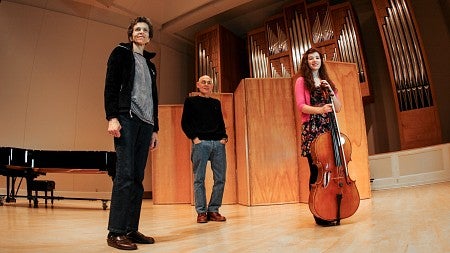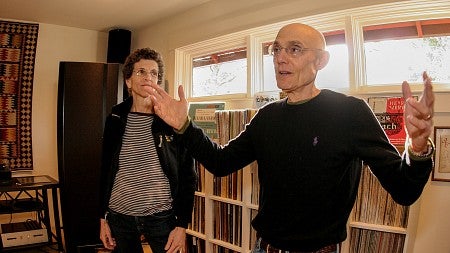Update–April 19, 2024
Music lovers attending a recital at the UO School of Music and Dance (SOMD) are likely to run into Mark and Mari Dembrow. Since 2008, the Eugene couple has exemplified an unwavering devotion to the SOMD, giving generously to student scholarships and supporting recipients by attending their performances and cultivating positive relationships.
In March, the Dembrows renewed their commitment to current and future students, signing a formal pledge to their named scholarship fund. This pledge supplements their generous bequest to the SOMD.

“It's nice that we're lucky enough to be able to do something,” Mark Dembrow smiled. “[There] is a diminishing pool of resources for young people in terms of arts and humanities. It’s disappearing, but it thrives here at the UO School of Music and Dance. That's one of the things that we feel particularly good about.”
The couple’s promise to lifelong giving stems from their enjoyment with the process so far. They have cherished the relationships formed with scholarship recipients, having supported eight students to date. Some of these bonds have grown so strong that they’ve remained in touch over the years, celebrating milestones like weddings together.
The Dembrows are particularly pleased with SOMD’s growth over the years. “It has been able to sustain exposure to the core western traditions as well as welcoming new ideas,” Mark said. “That’s a very difficult needle to thread these days. That’s important to us.”
Their admiration extends to the faculty and leadership brought by Dean Sabrina Madison-Cannon. “There are a lot of wonderful people and wonderful things happening here,” Mari said. Mark continued, “Sabrina is spectacular. She creates a wonderful aura of decency, acceptance, balance, and energy.”
The Dembrows emphasize the cumulative impact of donations of any size. “A gift from your savings toward the education of a young person conveys a message of faith and support of their efforts; this is more powerful than the dollars alone. Kids tend to work harder when we believe in them.”
Original Story–March 28, 2014
By Aaron Ragan-Fore
For Mark and Mari Dembrow, supporting students means more than just money. When Makenna Carrico, a University of Oregon sophomore majoring in composition, played the haunting final notes of Gabriel Fauré’s Elegy at a cello studio recital in Beall Concert Hall in May of 2013, she left the stage to find that two very special guests, Mark and Mari Dembrow, had brought her a congratulatory bouquet.
The Dembrows, however, aren’t Makenna’s parents, or her grandparents. In fact, they are not related to Makenna in any way. Mark and Mari are donors to the UO School of Music and Dance, and their ongoing support aids Carrico in her studies.
Never content to sit on the sidelines, the Dembrows are models of active, engaged members of the extended School of Music and Dance family. Mark and Mari first began supporting UO musicians in 2009, and have enjoyed getting to know the three awardees thus far. They are enjoying a return on their investment by enthusiastically attending events at Beall, especially student recitals and University Symphony Orchestra concerts.
“The whole atmosphere of Beall Hall is welcoming,” says Mari of her favorite performance venue. “The sound is fabulous. It’s like a sort of second home.”
That’s an apt description, given that you’re likely to see Mark and Mari in the same two seats in Beall Hall—in row P, on the stage right side, near the back—for thirty or more events each year.
Long-time Audiophiles
When it comes to classical music, the Dembrows are anything but dilettantes. Their love of the form extends beyond active attendance at Beall Concert Hall. In their charming, restored Craftsman-style bungalow in the Jefferson-Westside neighborhood of Eugene, Mark and Mari have dedicated a room solely to enjoying their collection of classical records from the 1950s and 60s—around 3000 pieces of vinyl, in all.

“We’ve been collecting most of our lives,” says Mark, recalling the stacks of classical records he squirreled away under his dorm room bed at Cornell University, where he studied economics in the 1960s.
Acceptable storage systems for an undergraduate are a far cry from the Dembrows’ current experience, however. The listening room includes comfortable modern chairs, an exacting record filing plan, and most important, a handmade mono block vacuum-tube sound system, with a pair of panel speakers that stand almost six feet tall.
Looking at their record collection and equipment now, it’s amazing to think of how far the Dembrows have come, both geographically and culturally, from their New York City childhoods. The pair have known one another since they were twelve years old, and began dating at their high school’s junior formal.
Mari attended Binghamton University while Mark was at Cornell, so after a college courtship in which they were separated by 50 miles, the couple graduated in the mid-1960s with Bachelor’s degrees, married, and began a life together in the big city.
“We were living a very affluent life in New York,” says Mark. They lived on Gramercy Park in Manhattan. Mark took a job as an investment banker at Goldman Sachs while Mari worked as a computer programmer at the advertising firm BBDO.
They enjoyed their lifestyle, but the couple felt that something was missing. It was time for a change.
East to West
Despite the fact they had never hiked nor camped, the Dembrows decided they wanted to spend some time in nature—a significant amount of time, in fact. In 1972 they purchased outdoor gear, loaded up a car, and left New York.
Or as Mark succinctly describes it, “We dropped out!”
For a full year the Dembrows explored the American West, hiking, camping, and backpacking.
At the end of their sojourn, the couple found a very special community awaiting them. On their way to visit a friend in Gresham, Oregon, Mari and Mark found themselves passing through Eugene. They were instantly transfixed by the growing city, especially by the educational, artistic, and cultural outlets of the University of Oregon. The Dembrows had found their new home.
The pair knew they’d have to support themselves, of course, but their former metropolitan paradigm didn’t feel quite right. The occupations the Dembrows adopted in Oregon diverged quite substantially from their former employment. Mari founded a business hand-crafting high-end wool sweaters, and eventually invested in three Italian knitting looms that she operated from their home with the help of three employees.
Mark, meanwhile, also heeded a new calling, that of educator. He enrolled at the UO, graduating in 1974 with a Master’s degree in education, then went on to teach elementary school for many years in the nearby towns of Fern Ridge and Springfield.
Throughout the intervening years since they left New York, one constant in the Dembrows’ lives has been music. It seemed only natural to take advantage of a nearby resource, so they began attending events at Beall Concert Hall. Eventually the Dembrows attended so many events that they found themselves mentally and emotionally invested in the lives of the UO’s music students and their professors.
“There was a sense of attachment to the students,” says Mark. “We’re getting so much out of this, it’s not fair not to give something back.”
Soon after their retirement five years ago, the Dembrows began giving to the school, and in 2013, they updated their will to include a bequest to the UO School of Music and Dance.
Each year the Dembrows make an annual gift to be awarded to a student performer on a string instrument or piano. This way, the Dembrows have an opportunity to interact, directly and immediately, with students benefitting from their donations—including the occasional delivery of flowers to relieved, post-recital musicians.
Carrico, who is the recipient of the Mark and Mari Dembrow Scholarship for both the 2012-13 and 2013-14 academic years, performs as a member of the University Symphony Orchestra, and enjoys playing Bach cello suites in a chamber setting. She hopes to one day compose film scores. Carrico says being a recipient of the Dembrows’ generosity “was really encouraging.”
“It made me a lot more confident,” says Carrico. “For somebody this early on in my studies to invest in the music is really important. It offers a chance for students to recognize they can do something with music.”
Besides the psychological boost, the funds she received from the Dembrows also had a more concrete effect for Carrico, allowing her enough financial leeway to purchase a new instrument this year. This is particularly important for a smaller person like Carrico, who performs best on a seven-eighths-scale cello.
The Dembrows report enormous satisfaction in watching their money at work in the lives of young musicians. Even the prospect of a few minutes spent with Carrico for the purposes of this article’s photo shoot is an opportunity Mark says “is just cool.”
Mari agrees, noting that donating to the School of Music and Dance has been “a totally satisfying experience for us.”
“Education is significant and important, not only from an economic standpoint,” Mark adds. “It helps a young person understand what it means to be a human.”
If you’d like to make a gift or bequest to assist students like Makenna, contact the development office of the School of Music and Dance at 541-852-9368 or by e-mail.
Photos by Erin Zysett.
